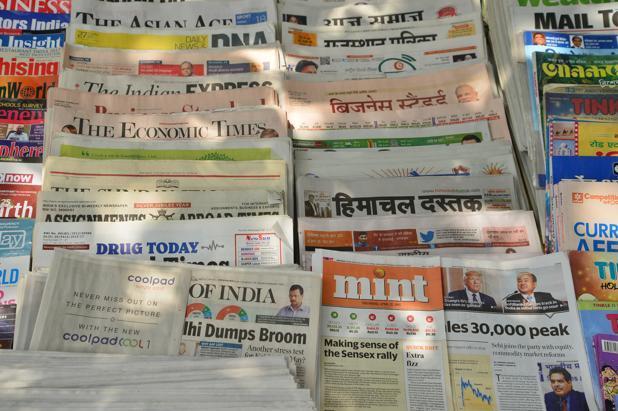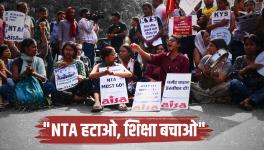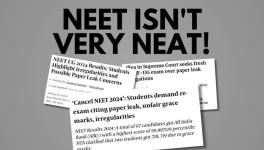Newspaper Ads: Are Tutorials Overtaking Navaratra Sales in Festive Season?

Representational image.
The first few pages of leading newspapers in the country, especially in North India, saw a marked shift in advertisements last week after a period of lull during the pandemic-induced lockdown. Before the beginning of the festival of Navaratras, Amazon, Flipkart and other such e-commerce companies flashed festive sales of their product range. Soon enough, as news of the NEET(National Eligibility-cum-Entrance Test) results for the medical undergraduate qualifiers was announced, without a break, these spaces have been occupied by various tutorials, education imparting agencies, such as Aakash, Allen etc., a majority of whom are based in the coaching hub Kota, Rajasthan, but have study centres in different cities across states.
One can only imagine the kind of money that has been pumped in by these educational centres/companies on such multi-page advertisements in national and local dailies that they have even upstaged foreign e-commerce giants, such as Amazon and others in times of business slump.
This just goes to show that education and imparting training to medical and engineering students for competitive exams has become one of the most flourishing and lucrative businesses in India in the past few decades. Thousands of crores of rupees is spent by parents on their children for these preparatory training courses.
In an interesting report carried out by a national daily a few days ago, education technical firms have cornered almost all $100 million (Rs 733 crore) bracket funds post-COVID-19. According to the report, in India, among the eight funding rounds of $100 million and above in start-ups during April-September, five involved education-technical companies, such as Byju’s, Vedantu, Unacademy and Eruditus. According to data sourced from Venture Intelligence, one-third of the $1.5 billion(Rs 9,250 crore) raised in these eight investment rounds were by Byju’s.
Byju’s classes have raised $500 million (Rs 3,700 crore) in two rounds in June and September from investors, including Tiger Global, General Atlantic, Silver Lake, Dst Global. Unacademy raised $153 million (Rs 1,000 crore) from SoftBank, IIFL, VC, Sequoia Capital, General Atlantic, nexus Venture Partners and many others. Likewise, Eruditus raised $113 million in August from Naspers, Chan Zuckerberg Initiative, Sequoia Capital. Vadantu raise $100 million from Midyar Network, Tiger Global, Coatue Management and other investors.
EQUITABLE EDUCATION OR APPROPRIATING PROFITS?
Why is such large foreign direct investment (FDI) flowing into the education sector in the country? Many supporters of the Indian government argue that there is a huge supply gap in meeting the rising demands of nearly 250 million school-going children. This is an argument given to veneer the real intention of such huge investments in the Indian education sector, the driving force for which is an eye on appropriating huge surplus money to maximise profits from Indian consumers.
Ursula Hews, in an article in the Socialist Register (page 65, 2019), states that one of the major shifts in the portfolio of some of the large transnational corporations over a period of three decades globally is from finance to utilities and services; education being one of the foremost. Cities, which are responsible for providing some essential services, have been coerced or have been incapacitated to make way for utilities be run by the large transnational corporations (TNCs). The major share of capitalist appropriation or generation of the surplus takes place in this form, and cities are becoming facilitators for this.
What we are, therefore, experiencing is the commoditisation of basic services, such as education, health and information technology etc. Massive appropriation of the surplus value is being generated in this exercise. And while this process was accelerating, there was actually a slowdown in the generation of new production and employment. So, in other words, the largest TNCs were sustaining their profits not because of production but because of cannibalisation of pre-existing production capacity.
According to Hews, of the 100 largest TNCs by 2006, as much as 20% were into services, which earlier was just 7% (1997). In the UK, in 2008, outsourced public services accounted for nearly 6% of GDP, which was an increase of 126% for the same period.
The post-neo-liberal era has changed the character of capitalism where maximisation of profit takes place not owing to production but because of other predatory aspects of capital, which is financial, like the bundling up of housing credit, commoditising services and likewise.
As Nik Theodore, Jamie Peck, and Neil Brenner point out, neo-liberalism is marked by “deregulation of state control over industry, assaults on organised labour, the reduction of corporate taxes, the privatization of public services and assets, the dismantling of social assistance programmes, the enhancement of international capital mobility, and the intensification of inter-locality competition.” This phase of development is quite evident in the Indian cities as well, which are seeing greater inequity.
Interestingly, a bulk of these investments in these educational giants are used for marketing or ‘inorganic expansion’. Of late, more cannibalisation is taking place by acquiring other platforms providing online education. For example, Byju has acquired WhiteHatJr for $300 million.
This is happening at a time when the government is abdicating from its responsibility of providing education and also imparting platforms for preparatory educational forums. These platforms are big money-making machines where education, instead of being considered a right, is being treated like a commodity.
Now wonder that, of the different forms of utilities that are being commoditised in the cities, like water, sanitation, electricity, education is one of the leading ones to generate surplus for these companies.
THE ALTERNATIVE
We have seen how the marginalised and other sections are completely excluded from these new ‘education’ imparting companies and the hullaballoo being created about competition is nothing but a farce. But, we have also seen how the ‘Super 30 model’ in Bihar worked for students belonging to the poorer sections of the society. But, this is also a piecemeal approach to tackle the problem.
The government must, therefore, facilitate centres for free coaching to all, particularly to students from the marginalised communities. The communities itself, especially the student community and their representatives, will have to create such platforms to guide students in this direction. I remember being part of pre-entrance test coaching centres being offered for free for everyone in my university in Himachal Pradesh to ensure that a level-playing field was generated. One has heard that Students Federation of India or SFI holds such centres for entrance tests to Jawaharlal Nehru University in Delhi and in some other universities.
A roadmap for reaching out to a large section of school-going students also needs to be drawn by the students' movement, apart from incessantly demanding a proactive role by the State to address this question.
The writer is former Deputy Mayor of Shimla, Himachal Pradesh. The views are personal.
Get the latest reports & analysis with people's perspective on Protests, movements & deep analytical videos, discussions of the current affairs in your Telegram app. Subscribe to NewsClick's Telegram channel & get Real-Time updates on stories, as they get published on our website.
























